In Rank Your Records, we talk to artists who have amassed substantial discographies over the years and ask them to rate their releases in order of personal preference.
“This isn’t going very well, is it?”
Videos by VICE
Alan Sparhawk, the co-founder, singer and guitarist of Low is struggling with the idea of ranking his records. “It’s almost easier to rate them by how mentally ill I was,” he says with a chuckle. “It’s really hard to pick favorites.”
Almost 15 minutes into our phone call, Sparhawk finds a way. “I guess if we can rate them for how forward we were thinking and how much progress we made expanding who we are and what we do, let’s do that.”
You can’t blame Sparhawk for his struggle. Over the last 25 years, he and his wife Mimi Parker, Low’s drummer, have put together a near-perfect catalog. Ask any longtime fan and they too would have trouble successfully ranking the band’s work in order. In that quarter-century, Low (which now includes bassist Steve Garrington) has consistently mesmerized their fans with music that at first helped launch the slowcore movement with its hushed, minimal arrangements. With each album they would evolve and leave the subgenre tags behind them (mostly), pushing their sound into bold new directions—none bolder than their brand new album, Double Negative.
Returning to producer BJ Burton, who helmed 2015’s Ones And Sixes, Low has yet again broken new ground with an album that is sparser, darker and more challenging than anything before.
“We definitely bumped into it with the last record, and this time we were seeing beyond these barriers of what we could do,” Sparhawk says. “We were a lot more permeable than we thought. It definitely feels like discovering something new. We’re excited about it and knew at a certain point as we were developing it that it was really out there and exhilarating. That thought was what drove us to finishing it, knowing we were onto something new here. Not necessarily new sounds, but this whole other level, sonically, that maybe had never been touched before.”
As the band hits its 25-year anniversary, Sparhawk says there are no real plans to celebrate. “I don’t know,” he says, “I think we celebrate every time we rehearse. Maybe we could put out reggae versions of all our old hits. We just feel really lucky to still do it.”

Alan Sparhawk: At the time, I think we were just getting our footing again after I had a bit of a mental breakdown. This was during The Great Destroyer and after Drums and Guns, I was kind of falling apart. I really crashed hard on that tour, plus we had lost our bass player, so we had a new person in the band. I was recovering from all of that, and trying to get a bearing on who I was and what the hell we were doing. I remember feeling the whole time like we weren’t ready. I wished we had a few more months to work on that stuff. You get that with every record. You go in and say, “Aww, I wish I could figure this song out a little better. I wish we had a few more tunes.” You’re always wishing you’re a little more prepared.
I mean, this was a good experience and the producer, Matt Beckley, did a really good job, but I was trying to find my feet, personally, and Steve had just joined the band. So it took that record to try and regain a sense of who we were.
Noisey: Was it easier to just fall back on what you were comfortable with?
I mean, you can want to push forward and have ideas that you try out, but you’ve got to be confident and competent with your material before you can go in and tear it up. If you look at Drums and Guns or Double Negative, we went in with songs, but said, “We already know that when we play them this way, they sound like this, but we want to find something else.” To really find something new and fresh you’ve gotta know inside and out what you’re doing. But with this album, I was questioning myself all of the time and scrambling to play better and figure out what I was doing, so I wasn’t very progressive. I wasn’t taking any forward steps. It’s kind of a mish-mash of songs thrown on there. Some of them worked out great. I don’t remember having any particular direction or feel that we were going for.
How did you get John Stamos to star in your video for “Try to Sleep”?
Matt, who recorded and mixed the record, lives in LA and he’s friends with [Stamos]. It kind of just came up. Another guy we knew was making the video, and Matt just said, “I’ll ask John Stamos if he wants to be in it.” It was nice. Someone knew someone and he just happened to have a free afternoon. It was pretty easy and cool. But we didn’t even meet him. The video was shot in LA while we were on tour. He sure is a beloved character.
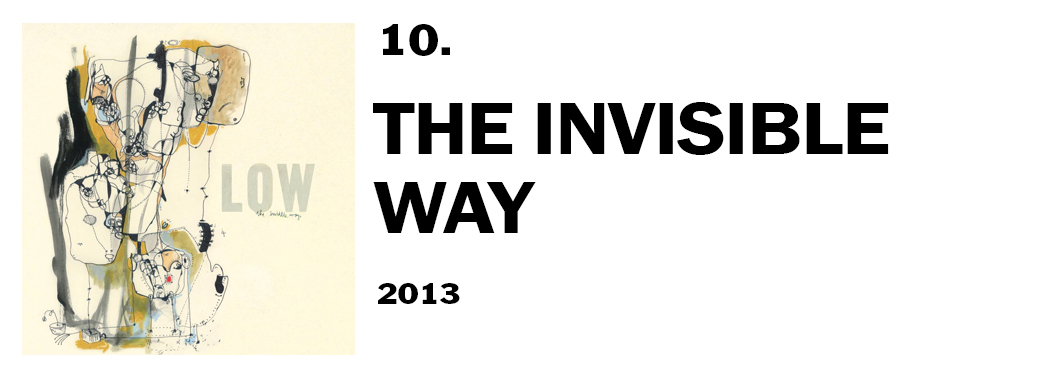
Aww, I feel bad putting this one so far down on the list. Honestly, the reason why it’s so far down is because it was such a smooth and comfortable session. Jeff [Tweedy] and everybody in the studio were very nice and encouraging. It was just so casual and very low pressure. I had done demos for the songs and we were really prepared. We just tried to beat the demos. There wasn’t much hand-wringing and frustration, which usually comes with making records.
Yes, so Jeff Tweedy produced this album. Was he the one to bring in the warmer sounds?
We were kind of aiming for it. It wasn’t consciously spoken. The space was really chill. When we got there we tried out some new instruments, like the acoustic guitar and piano. They had this great, dialled-in piano sound there that Steve brought out really well. So it wasn’t necessarily Jeff going, “We’ve got to make this sound more Americana!” I think people felt he was pushing us towards a more acoustic thing, but no, it just happened to be this vibe that worked when we got there and started playing the songs. The engineer, Tom Schick, is just so good at getting these warm, close-up, real sounds.
I read that you’re not too fond of pianos, which are all over this record. What do you have against them?
It’s a love-hate thing. It’s such a useful and dynamic instrument that tracks so well. For those same reasons it just frustrates me. It’s been used for so many years and you hear it so often, I feel like there are so many connotations. I’m always trying to be careful and it’s just so easy to use the piano. At the end of recording I said, “Wow, that was a lot of piano! I’ll look at some other possibilities next time.” It’s a very powerful instrument that is great if you’re in the mood for it.
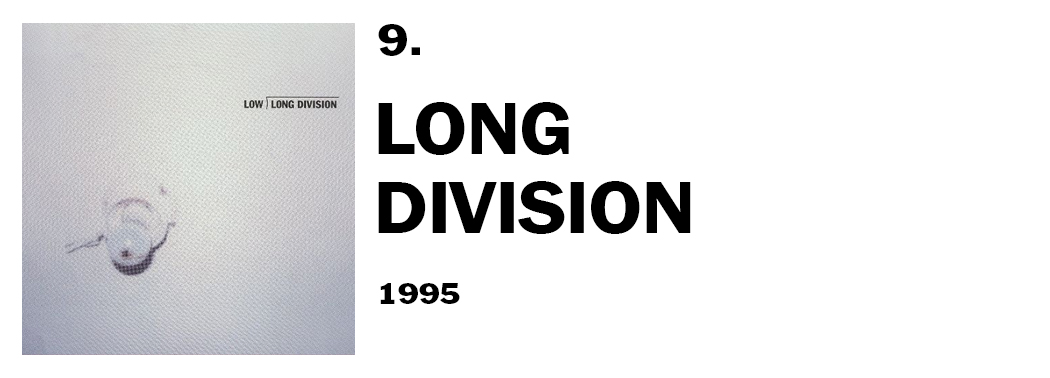
The only reason it’s lower is because I felt like we were just following up on the first record. We’d done the first and, within a year, we were back in with the same producer, Kramer, who had a certain sound and we had a small budget, so it was like, “Set up and play the songs so we can get this done in two days!” And that’s what we did. That one was exciting because a lot of times a band does the first record, but then you only have six months to do something as good as one that took you three or four years to make. The second record can be weird like that. But we were lucky to get in there quickly and cut it while we were still discovering the band. We were really happy with how the first record sounded, so we were just plugging in and playing the new tunes. So yeah, not as much experimentation as what we would get into later on.
This was your first record with Zak Sally playing bass.
Yeah, he was pretty new to the band and what we were doing. Our sound was already there, so, because we were all set to go on tour, for all intents and purposes he just learned the tunes that we were playing. For the first while that’s all he was doing. With Long Division, half of the tunes we were recording were written before Zak joined the band. It wasn’t until The Curtain Hits The Cast that he became more comfortable and began creating and interacting more with us.
Billboard published an article called “Vernon Yard/Virgin is counting on Low’s ‘Long Division.’” Was there pressure from the label?
Nah, I think that’s just a clever headline. Vernon Yard was interesting because it was the early 90s and the label had a little group of indie bands and some staff. Everyone thought indie music was gonna blow up. The first Verve record really put Vernon Yard on the map. I think maybe we were the first band to do a second record on the label, and some people felt the label was now for real. I think by the time we were doing this record, the label was gaining profile, but it was still kind of a weird, novel thing.
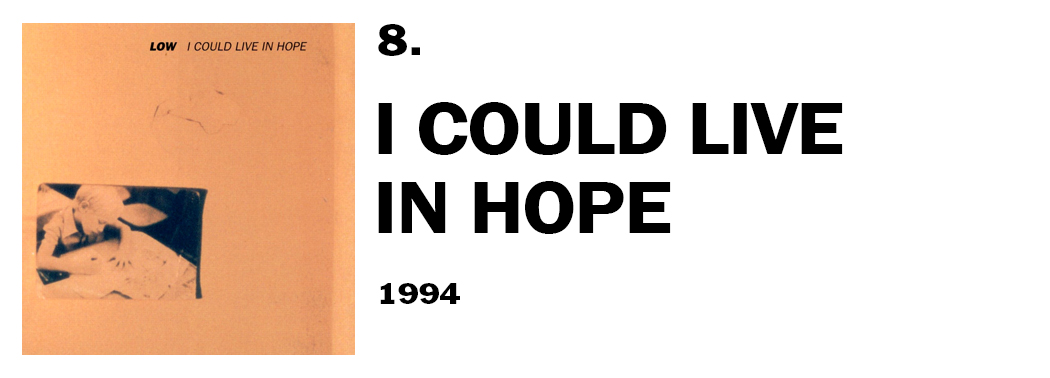
Some people think of this album as the birth of slowcore. Did you know of any bands like Low when you and Mimi began?
Well, we knew of Galaxie 500, which is why we sent demos to Kramer. He had done some of their records, so we thought, “Maybe this guy will be sympathetic to what we’re doing.” I was seeing early Cure and Joy Division as the early touchstones, but I remember when we tracked this first record, we came home and I heard Red House Painters. I just thought, “Oh wow, this guy is really good.” And for the next few years the press would try to put us in the same category as them. I remember hearing Codeine early on too and thinking, “Wow, these guys are going way extreme with things that we’re just barely touching.” I was pretty in awe of them. I remember having to force myself to not listen to Codeine and Red House Painters sometimes when I was writing, because I’d find myself falling too easily into their mannerisms and phrasings. It resonated really well with me.
Speaking to Billboard back in 1995 about performing, you said, “At first we just wanted to annoy people by giving them all of this tension and no release. But a few songs in we realized that we were actually having fun with it.”
It’s definitely still the core of the band. For better or worse it still feels primal when I’m up there on stage. It feels like combat. [Laughs] I have to consciously tell myself that we’re not at one of those first shows where we’d start playing and people would walk out or start yelling at us after the first ten seconds. I can’t shake the feeling that it’s a battle with the audience, even though we play these nice places where people pay good money to come see us. In some ways I think that drives me. It’s probably a very juvenile tendency.
I think that’s part of what people like about seeing Low, is that unsettling intimacy.
Maybe, yeah, it’s disturbing. I suppose people come for that since it’s such an obvious element of the band. But I’m always a little jittery and feel there is a complicated hallucination going on in my head about what’s going on between me and whoever is in the room.
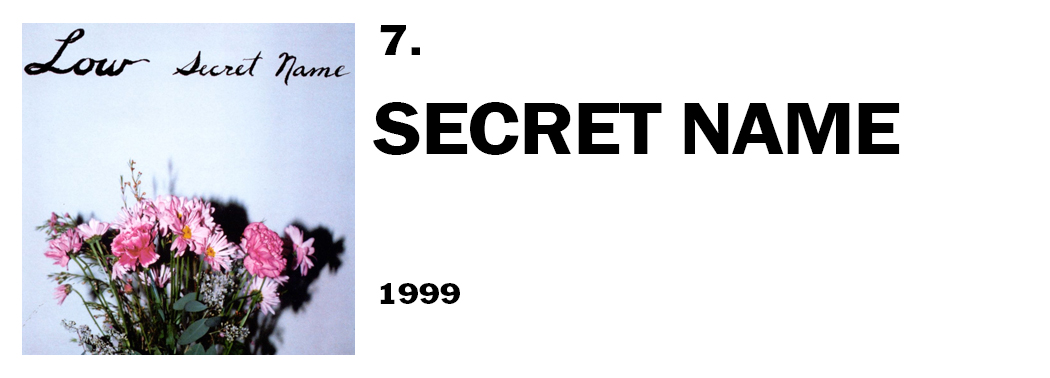
That was the first full-length we’d done with Steve [Albini]. He had just built his studio in Chicago, so we were one of the first bands to record there, and that was pretty exciting. He was still figuring out the new studio, and we were one of the first quiet bands to work with him, so he was excited about that. We were right on the edge, I guess, we’d been expanding the studio experience on the couple previous albums, adding new instruments. So by the time we got to Steve, we were wondering if he would look down his nose at us for bringing in strings or this or that. But no, he was very into recording whatever we wanted to use. We were moving forward on this record, but was all stuff we’d been working with for a while.
Right, but Albini is notorious for claiming he is not a producer.
But he’s notorious for telling you if something is stupid. [Laughs] He’ll record it, but he will tell you that it’s stupid. Now, I’ve only heard he’ll do that. He never did it with us though. Maybe we just never got to the point where he thought it was ridiculous. I just remember being a bit surprised about how eager he was to try other things than loud drums and guitars.
This was your first album for Kranky. Was leaving a major for an indie of any significance for you?
Yeah, it was really exciting. It was in the 90s when independent labels were doing all right. They could function on a small level and people were buying records, so they could count on that. There were a lot of labels doing different things, and it was becoming more feasible for them to handle stuff. We were friends with Labradford, who were on Kranky. The guys from the label would show up at our shows and talk to us, so when it was time to move on from Vernon Yard they were the obvious choice. First we did an EP [1997’s Songs For A Dead Pilot] with them before Secret Name, so we already had a sense of what it was like to work with them. The EP we did was experimental, and we did it in our basement at home. Before on Vernon Yard we could have done whatever we wanted, but there was something about being on Kranky, where it felt like we had a mandate to be progressive and experimental and take some chances. Those Kranky records gave us confidence to go in and do whatever we wanted.
This album is where you began to incorporate synthesizers and strings. Was that just a logical progression for you guys?
Part of it was being a little more out there. That first EP allowed us to try a lot of wacky things that maybe another label wouldn’t have liked. Adding keyboards and synths was just a natural progression of doing this record. We gained more confidence by doing those types of things. With Kranky we totally took the lid off. The concept of being on that label was invigorating and empowering in a certain way.
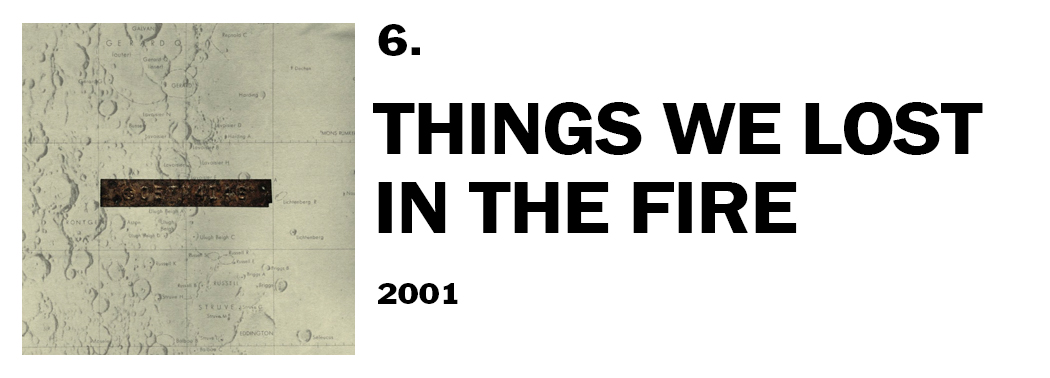
I read an interview where you said you hated this album the first time you heard it.
Oh yeah. I get that feeling with pretty much every record. [Laughs] I think that was because it was one of the first records we worked on for a period of time, and it opened up to that feeling of “one day you like it, one day you hate it.” But yeah, that was the first time we felt the big wave of doubt, and I think that’s because it was so drawn out, whereas when you make a record in one or two days, that’s it. There is no decision-making going on. We just play our songs and it’s done. The longer the process, the more grey area decisions there are.
Apparently the band was all-in to make this a pop record, or at least Low’s version of a pop record.
Yeah, there were a few records where we were trying to find our version of a pop sound. We listened to Pet Sounds a lot and were thinking, “Horns! Maybe…” I’m chuckling because looking back, there was this naïveté, and it was indie rock and bands like us only had so much access to technology and what the studio could do. All of the slick possibilities were priced out for smaller bands, unlike today where a little bit of software and some of the right gear and you can make something that sounds pretty hi-fi.

This was the first record where we thought, “We can do other things in the studio? Oh, okay, let’s try it then.” It was just a little on our end, but it was the first time we felt we could do something crazy, like write a really long song.
Like the near-15-minute “Do You Know How To Waltz?”?
Yeah. Around Long Division we were touring a lot and getting our feet, but also expanding and figuring things out. Steve Fisk, who produced this, is an eclectic artist who plays keyboards and is really up for anything. We mentioned keyboards and then he showed up with five or six vintage keyboards and organs for us to mess with. Kramer was cool, but he had his way of doing things, whereas Fisk was like, “What can we do in the studio now? What can we add?” I think that’s why this is higher up on the list, because it was the first time we were trying something different.
This was your third album in three years. That’s impressive.
It was weird because that wasn’t so uncommon in the 90s for indie bands to churn something out every year. We’d do seven-inches, split singles—bands would just go into the studio and put it out all the time. Obviously, over time, bands would get a bigger budget and spend more time on records.
This album was followed by OwL Remix . Low didn’t seem like the type of band that would get dance remixes in the 90s. Whose idea was it to put this together?
Somebody from Vernon Yard approached us and said, “You should check out some of these electronic people.” I remember at the time we were like, “Meh, I don’t know about that.” We were pretty naïve and a little stuck-up about this new electronic music. But they basically curated and approached people. It was a pretty weird time. People were like, “What is this? How do we fit this in with the rest of the records we’re trying to sell?” But yeah, it was cool. I like a lot of those remixes. I think some of that stuff holds up strong.
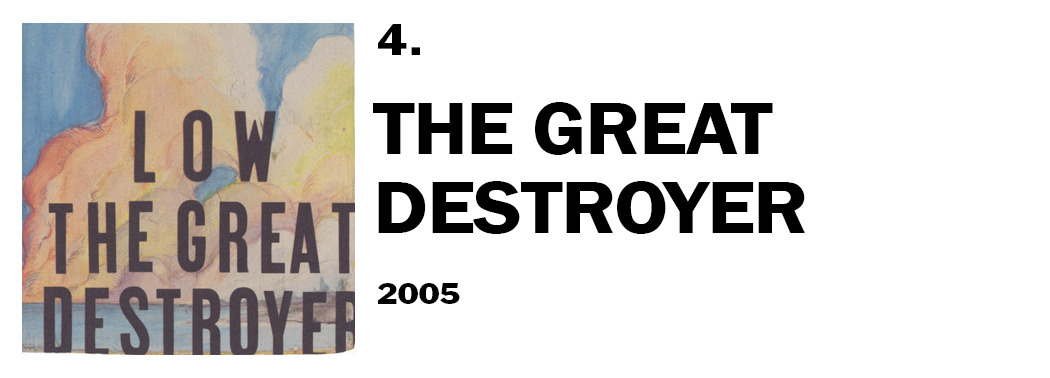
I always feel like this was the culmination of a trajectory we’d been on for a few records. We were playing louder shows and I was probably obsessed with writing pop songs with a verse-chorus-verse structure. I was a little more particular about the craft of song back then. That was probably the last example of my meticulous songwriting. Since then, I’ve been looser and a little more okay with things being fragmented and not so perfect. Plus, this was with Dave Fridmann, which was an exciting step forward for us. Sonically, he was just interested in making something cool and going beyond expectations. He was hinting at us to go loud with the guitars, and then he was like, “That’s cool, but what else can you do?” Essentially, he had already started the conversation that would lead to Drums and Guns. So with this one we were kind of hitting the ceiling. A three-piece band trying to play as loud as we could.
“California” is such a good rock song. In the early days, you said that Mim was totally resigned to never rock out. I guess she had a change of heart?
[Laughs] Well, she gave into some pressure. No, I don’t think we’ve ever forced her to play the drums any louder or more raucous than she’s comfortable with. But there was definitely a push and pull. Mimi is the quieter element in the band, and she’d rather things be pretty than ugly. So there is always a balance, which is a good thing. If I was left to my own decision-making I’d quickly implode.
Zak left just a few months after releasing this album, while you were dealing with some mental health problems. How hard was his departure for you?
That was kinda tough, because we made The Great Destroyer and then went home. The next day he said, “This is my last record. I’ll go on tour with you but then I’m gone.” No, wait, after Trust he said, “This is it.” So we toured Trust and he came back. It was weird. There was a small period where we thought that was it. Mim and I thought it was just us. We had already kinda moved on and did an EP. So he left and there was a while where we thought he was out, but then he came back. So we did The Great Destroyer, he left again with more permanence. It was a tough time. I can’t deny the stress of that didn’t have a bearing on my mental state. I had been on my way to that breakdown since I was seven years old, so it was just getting worse. And I can’t blame Zak. It was a very difficult time. He had just gotten married and had a kid coming, so it’s understandable. It was just a weird stretch there. I think there is a little bit of tension in The Great Destroyer, along with some underlying frustration and anger. I was feeling pretty hurt, and he was a good friend. I’m sure the whole time he may have felt it was a bad decision. [Laughs]
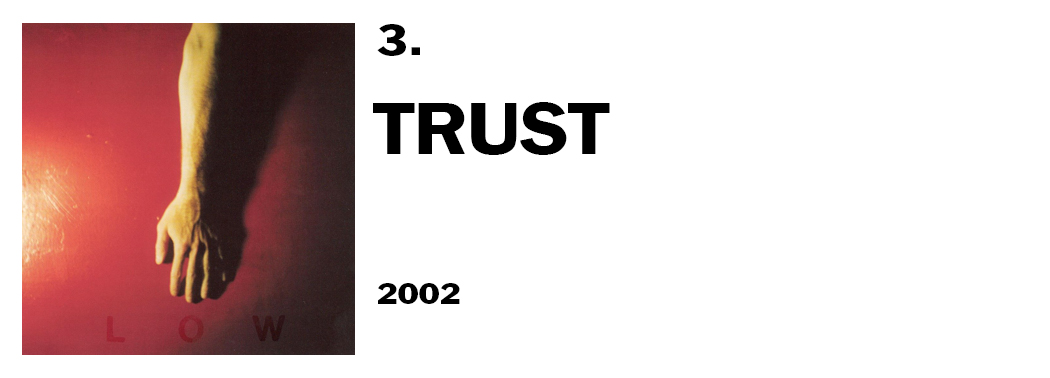
I think, by Trust, we were starting to realize what we were pushing against in the studio. We’d moved on from keyboards to stomping, wood blocks, and creaky chairs, that kind of stuff. We were pushing the dynamic of “how do we make a loud sound and put that against something more subtle and quiet?” We worked with Tchad Blake, who I’m a huge, huge fan of. That was really fun. He is like Fridmann: you go in and he’d have all of these ideas, like blowing out a rhythm track or transforming a sound into something way more interesting.
“Canada” was a precursor to The Great Destroyer. As a Canadian, I’ve gotta say we love that song up here.
Oh really? I always get nervous about playing that song in Canada. I always thought people would think, “Oh man, they’re gonna play that stupid song named after our country!” Like it was too obvious to play that song for them. We’ll play “Canada” the next time we’re up there. I wanna do a whole record of Canada songs now.
I’ve always felt that this was the most overlooked Low album.
Yeah, that’s funny, because around that time Joel from Kranky would say, “What you guys need to do is make a really bad record, so then you can come back from that.” I think by that point we weren’t doing the same thing over and over, but we were kind of in the same trajectory for a few records. I can see how someone would be like, “Oh, a new Low record. That’s cool. Whatever.” That wouldn’t surprise me. There were a lot of records coming out at that time, and we had already released quite a few of our own. I could see why people would like that record a lot and there were some cool things we worked out in the studio. Plus, I really like Tchad Blake.
What was it like to tour with a band like Radiohead?
Cool. Actually, it was the reason why Zak came back after he left the band. So it was a little weird and awkward time for us. We got back from touring Trust and Zak was done, but then we got a call to play some Radiohead dates and were like, “Crap! We’ve gotta find a bass player.” But yeah, it was a cool tour that was out of the blue. Someone had mentioned that Thom [Yorke] said good things about our record in an interview, which I surprised by. And then we got the call. The tour was weird, because we thought one thing was happening, and then it changed. It was down time for us, because we’d already toured for a year and finished the album cycle. It seems when you put a record out, those first four or five months are for touring. So there’s a purpose where the focus is on the songs that are the most relevant in this moment, and then a few other songs they may like.
I heard you didn’t get the warmest reception when you played in New York though.
I can’t complain too much because we were playing Madison Square Garden with Radiohead. [Laughs] It was a blessing. But it was totally weird. We had toured with them in Europe, and then four or five months later the band on tour with them in the States had to cancel on short notice. [Ed note: the band was Supergrass.] So they called us and asked if we could come open for them in New York. So it was this feeling of, “Okay, we’re filling in for another band that the fans would rather see.” And it was New York. In Europe, when we went on stage, most of the place was full. Over there, they show up early to see the opening band. I had seen Radiohead out near Chicago when Stephen Malkmus and the Jicks were opening for them, and there were like 400 people watching him. Then, after he finishes, 20 minutes later 30,000 people come in! I felt so bad for him. Sure enough, while we were playing at Madison Square Garden it was “find your seat time” and “heckle the band time.” But I guess that’s what we get for being a lowly little band from Minnesota horning in on the coolest turf ever. Maybe that was just in my head, but I felt intimidated, like everyone in the audience was asking, “Why the hell are these guys here?”

That one, again, was pretty driven by the person we were working with, BJ Burton. I had spent a lot of time working on other people’s music with him, so I knew he liked the idea of tearing things up and finding new sounds and textures. So we’d already had a larger conversation about aesthetic before we went in to do the record. For me, this record is sort of the beginning of Low’s new beginning or new possibilities. We were trying to step out of our comfort zone. Ones And Sixes is essentially us refocusing. I liked The Invisible Way, but I remember specifically after that record thinking how the next one would be really different.
You described BJ as “very aggressive sonically.” What does that mean?
He’s not content to just let a sound be what it is. He would just start digging in on the computer and rerouting and twisting things. He takes these organic fragments that we give him and kind of explodes them. In turn, that inspired us to write and be open to everything. Like, “This is great. I’m never going to listen to a repetitive, ominous sound the same way again.” He changes your perception of what’s possible and what can be music. He tries to find sounds that nobody’s heard before. We really like working with him and how he inspires us. We’re able to turn out some pretty raw, loose, and fragmented things when we’re with him.
The album was originally going to be titled I Ain’t Your DJ. Good call going with Ones And Sixes.
That’s a line from a song. I actually made a few t-shirts that said “I Ain’t Your DJ” but it didn’t fly the way I thought it would. I think it’s genius, because it’s like, “I’m not responsible for your vibe!” Unfortunately ironic, silly titles never work.
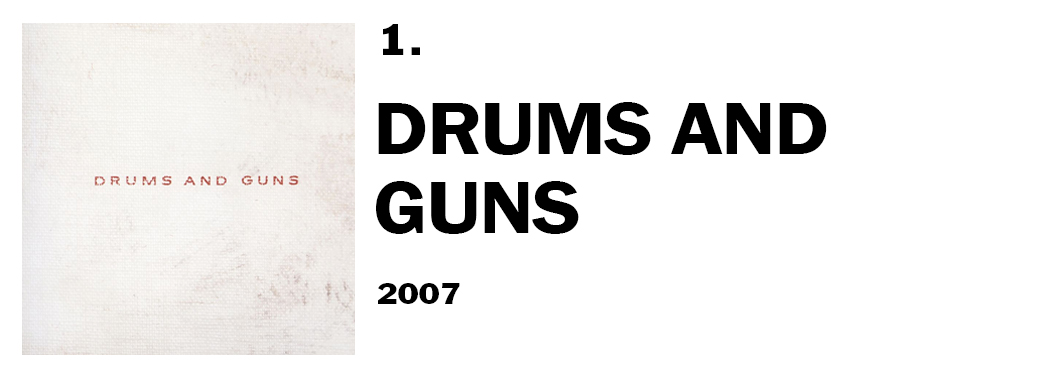
It was the first time we really took some chances. We knew how to build a song with bass, drums, and guitar, so this was about doing something completely different, like being okay with two sounds making up a song: a rhythm and something harmonic. The lid was completely off. For the first time we were experienced being untethered by our own selves in a way that makes pure creativity. Like, “Here are instruments you’ve never touched before. Make a song with it.” You’d be surprised that you can do that.
Drums and Guns has been a constant reference over the past few years for us. I keep reminding myself of how much that was a super awkward process. It was uncomfortable and a gamble to step away from familiarity in an effort to find new possibilities.
People seemed to mistake this as an electronic record, but to me it was more about having less guitar. What brought that on?
I do like the guitar. I like what it does and I enjoy playing it. This new album had a running joke where Steve and Mim would keep saying to me, “Are you going to put any guitar on this track? I don’t hear any!” I guess I’d like to think that because it’s the closest, most intimate instrument to me I felt that the easiest way to get outside of my element in a more honest way is to set aside the thing that I most lean on. It was a little bit of a sacrifice to make.
It’s fascinating that Fridmann also produced The Great Destroyer, your loud guitar record.
Going in to work with Fridmann on The Great Destroyer, we already had this sound and the trajectory, so he welcomed it. The interpersonal dynamic wasn’t there yet, so he wasn’t quite comfortable enough to tell us we should do something differently. So for the first record, it was like, “What ya got? Let’s capture it.” Then, when we were done with the first record, he had some ideas for the next one. I remember having conversations towards the end of recording Destroyer about ways to get further out. We were already talking about split, right and left stereo/mono thing, where we have all the rhythm on one side and all the vocals on the other side. It’s weird because we did the one of us arriving, and then the next one was him challenging us to find new sounds. And as much as it was record that some people really got into, most people didn’t. I really like it. There are some moments on there that are my favorite. So up until that point, I’d say it was the farthest we’d gone to challenge our creativity.
You ate an entire cake in the video for “Breaker,” which is only three minutes long. How were you feeling afterwards?
It was really weird. Your brain kinda goes into shock—even just 30 seconds into eating it. Your subconscious starts screaming, “What are you doing? Stop whatever is going on here!” There are definitely some triggers for your brain. The adrenaline kicks in and your stomach is also wondering what’s going on. I’d never tried to speed-eat or binge before, so the whole time there was two sides of my mind fighting. One side was telling me to stop, the other was telling me to keep going.
How many takes was it?
Just one. And just towards the end of the video you can start to see me throwing up. I puked a little bit, but I kept most of it down. I did spend the next 15 minutes shaking, though. [Laughs]
More
From VICE
-

Collage by VICE -

(Photo via Shawano County Sheriff’s Office) -

Harry Herd/Redferns/Getty Images

